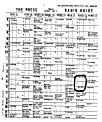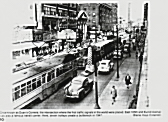
Adam was "Bob Franklin" at WSRSEmail Adam - adam@adamjones.info | |
First Job - WSRS Cleveland
I don't know if anyone will read this who remembers WSRS in Cleveland Hts., Ohio. Or Bob Franklin. But that was the first station I worked at. My first time on the air was on my 17th birthday, December 31st, 1954. It was a night-time remote from Hoffman's Restaurant, near E. 105th and Euclid in Cleveland.
At that time, this was a very thriving area, with stores of all kinds, lots of theaters, bowling alleys, etc. The manager of Hoffman's had bought the remote from the station and paid me to do it. The general manager of WSRS, Norm Bergholm (a man I had met a few weeks earlier at a nightclub where I was trying my best to do a little comedy) was listening and liked what he heard. So, he gave me some part-time work on the weekends, and boy, what thrill that was! WSRS, known by some as, "World's Shi____st Radio Station" had 250 Watts and was at 1490 AM, with a very small audience by 1950's standards (there were only eight stations in the Cleveland Metro area.) I'll bet if a station had that much audience today, it would be in the top five, now that everything is so fragmented.
The station was at the corner of Cedar and Lee Road in Cleveland Hts. The studio and transmitter were on the second floor over a Ford dealership, and the tower was on top of the building. I remember walking up Cedar hill, looking up at the tower and being so excited, knowing that really important things were happening at the station. I could hardly believe that when I spoke into the microphone, somehow it was going to be transmitted out of that tower and heard by strangers all over the east side of Cleveland.
In those days, being on the radio was a really big deal, and something to be very proud of. Only about 60% of the people in the country had TV's at that time. And there were only 2000 radio stations in the whole country. Today, there are about thirteen or fourteen thousand.
It was really wonderful to be on the air, and I loved every minute of it, even when I put in long, long hours on some weekends. Lots of times, I would work from 5 or 6 p.m. til 1 a.m. on Saturday nights, sign off, and sleep on the couch in the conference room. At 5:30 a.m. Sunday, I would wash up in the men's room, go across Cedar Rd. to the Royal Castle 24 Hour Deathburger Factory, and get some black coffee and burgers. Their singing radio jingle went, "Royal Castle Hamburgers, fit for a king, fifteen cents." And it went on and on for 30 seconds, over and over. They were not only NOT fit for a king; they were hardly fit for human consumption. But nothing else was open on Sunday. The kid behind the counter looked like the kid in the Simpsons ("If I had a girlfriend, she'd kill me.") He was always cleaning the place with ammonia water.
So. . . I took my sack of botulism back to the station. My regular shift on Sunday was from 2 p.m. to midnight. The announcer on the early morning shift, 6 a.m. to 2 p.m., was Kenny Bass. Kenny had a popular polka band called the Polka Poppers (sounds like something out a John Candy movie.) So when he was out of town with the band, I would work from 6 a.m. to midnight. So it was Saturday night and all day Sunday. The owner of the station, Sam Segue (pronounced, seg-YOU, although a lot of people did call him Sam Segway), didn't seem to care, so I was happy to do it. I needed the money.
On Sunday til about 6 p.m., all the programming was either taped, ET (electrical transcriptions), or live ethnic shows - The Hungarian Hour, The Latvian Hour, The Polish Hour, The Italian Hour, and so on. The funny thing is, I remember most of them being 30 minutes long. I guess they started out to be an hour and after awhile lost half their sponsors. At 6 p.m. the taped and network shows would start. At one point, WSRS had two networks. I guess nobody wanted networks anymore so we took a couple. There was Mutual Broadcasting and ABN (American Broadcasting Network.) Two networks could be a nightmare for a board engineer. For example, ABN News started at 55 minutes past the hour, minus ten seconds. Mutual News started on the hour, plus ten seconds. To add to the confusion, we had Western Union clocks. Almost all stations did. These clocks had batteries and were all connected to a master clock hidden somewhere in Mr. Union's basement. The one thing that made them unusual was that all the Western Union clocks in the country would reset themselves at the top of the hour. However, some clocks would run a few seconds slow, which meant the second hand would jump forward. And some clocks would run a little fast, so the second hand would jump back. We had three studio clocks in the station. So if the announcer on duty had a one minute commercial to read leading up to a network show, he had to remember which network it was, and when they started their programs, and whether the clock he was using was slow or fast - and then read at the right speed to make it all work.
Although I only talked to the boss a few times, I was told that S. R. Segue wanted very much for his station to be considered a Cleveland station, and that he hated the fact that his license read, "Cleveland Heights," and especially that he had to say so on every station break every half hour. So - when he got a big write-up in the Cleveland Press (a now-defunct newspaper) which said that he would be carrying the Metropolitan Opera Auditions of the Air, he thought it was our big chance to get some high-class audience. The program was hosted by Milton Cross, a very well-known announcer with a voice that sounded like someone sawing cardboard with a dull knife. Just an awful voice. The program was on the network from 7 to 8 p.m. We were to record it and play it back from 9 to 10 p.m.
Now between 7 and 8 p.m. on the first Sunday of the program, there were a whole lot of things going on, and the young engineer, Ronny Powell, forgot to start the tape recorder. He started it five minutes late, at 7:05. So at 9:00 I had to announce that we were joining the program in progress. Well the boss called and was not very happy. The next week, it happened again. This time Mr. Segue called and said that if it happened the following week, we were both fired. Well, the next Sunday night, we were determined that no matter what happened, the Metropolitan Opera Auditions of the Air were going on without a hitch. By golly, we may only have had one listener, but he was a big one. At 7 p.m. we taped it okay. When broadcast time came, with a great deal of confidence, I opened the mic and said, "Stay tuned for the Metropolitan Opera Auditions of the Air. It's Nine O'Clock." The good old Western Union Clock corrected itself, and Ronny started the tape, and guess what happened. It went across the playback head and broke. It was on the air okay, but the tape was running all over the floor. And then all over the chair. And then all over the control board. Ronny and I ran out of the room so we wouldn't touch the tape. I'll never forget watching through the control room window as the tape piled up. We were scared to death and praying that the tape wouldn't get caught in the machine. It didn't! In those days some people thought that if tape piled up on the floor and you didn't touch it, you could put the recorder in rewind and the tape would go right back on the reel. It didn't. If you want to know what happened to the tape, we gathered it up in a great big box, and put the box behind Royal Castle.
I learned a lot at WSRS and worked with a lot of good people - Chris Miller, Bob Forester, Ted Lawrence, Bill Crane, Andy Franklin, Chuck Renwick, and Sam Sampson (who actually used the name "Crazy Man" on the air.) Filling in for these guys gave me a lot of valuable experience. And there were great board engineers, like Chuck Owens, Bob Leedam, Ronny Powell, Arnie Rosenburg - just to name a few. Later, I worked my way up to afternoon drive time. The prestige of working in Cleveland helped me get jobs in other markets, and I will always be thankful for that.
- Adam Jones
1-22-07
 Click to view Cleveland Press Radio Guide 7/4/1958
 Click to view Cleveland's 105th and Euclid as it appeared in 1947
In 1954 it looked the same except the streetcars were gone, and tracks had been removed. Hoffman's restaurant in middle of the block was site of Bob Franklin's first broadcast on 12/31/54.
|